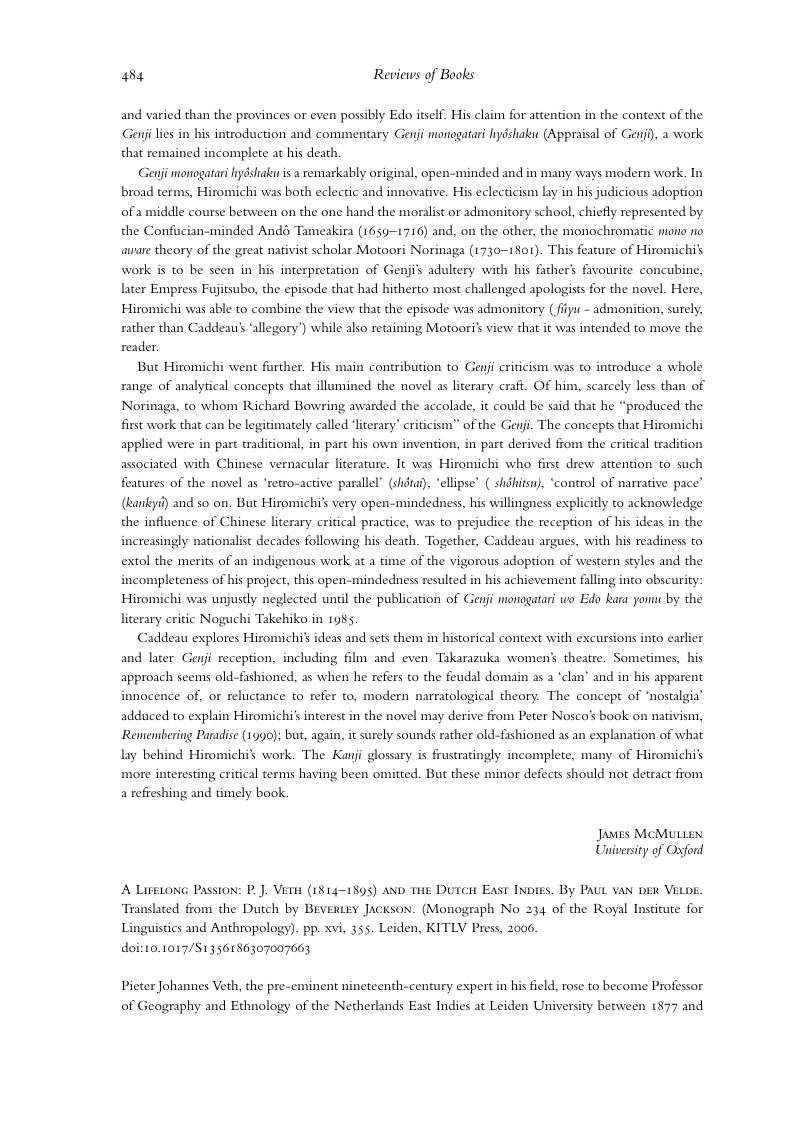No CrossRef data available.
Article contents
A Lifelong Passion: P. J. Veth (1814–1895) and the Dutch East Indies. By Paul van der Velde. Translated from the Dutch by Beverley Jackson. (Monograph No 234 of the Royal Institute for Linguistics and Anthropology). pp. xvi, 355. Leiden, KITLV Press, 2006.
Published online by Cambridge University Press: 24 October 2007
Abstract

- Type
- Book Review
- Information
- Copyright
- Copyright © The Royal Asiatic Society 2007
References
1 E.M. Beekman (Afterword, p. 339, in Multatuli, Max Havelaar: Or the Coffee Auctions of the Dutch Trading Company, University of Massachusetts Press, Amherst, 1982).
2 The Cultivation System obliged farmers, mainly in Java, “to bring land under cultivation for the production of cash crops, the sale of which would enable them to pay the land tax”. The government of the East Indies was required to implement a batig slot (positive net revenue) policy. From 1832 to 1877 the colonial government remitted eighteen million guilders annually to the Netherlands, or one-third of the metropolitan power's budget (Pierre van der Eng, in Ooi Keat Gin (ed.), Southeast Asia: A Historical Encyclopaedia from Angkor Wat to East Timor, ABC-Clio; Santa Barbara, Denver, Oxford; 2004), (I: p. 391–393).
3 Conversely, this very fact is a source of shame for Indonesians themselves.
The population of the Netherlands was still only five millions as late as 1900, compared with more than fourteen millions in Java alone thirty-five years earlier (Bernard Porter, The Lion's Share: A Short History of British Imperialism, Longman, London and New York, 1975, p. 75; A.R. Wallace, The Malay Archipelago, OUP, Shah Alam, 1986), (p. 108).
4 In later days Veth was quick to accept Darwin's ideas about evolution as ‘irrefutable’ (p. 178).
5 He could also translate from English (as mentioned already) and Italian.
6 The Franeker Athenaeum was closed down in 1843 (p. 66).
7 To be fair, the Central Sumatran expedition (1877–9) is regarded in retrospect as having ‘restored the Dutch reputation for research on the colonies’ (p. 231). And Daniël certainly had talent as a cartographer, photographer, geographer, and exhibition-organiser (pp. 206, 212, 214, 225, 227, 247, 249, 254). Furthermore, Veth insisted on being interred in his son's grave in due course (p. 284).
8 Huibert completed classical grammar school ‘with the highest possible distinction’ (1864); gained a bachelor's degree at Leiden University (1867), which was, after all, the country's most prestigious seat of learning; took a master's degree with distinction in fewer than twelve months; and taught biology at the modern grammar school in Rotterdam from 1872 until retirement age. Meanwhile, he took a doctorate in mathematics and physics at Leiden in 1879 (pp. 185–186). This does not appear prima facie to be an entirely ignominious record.


